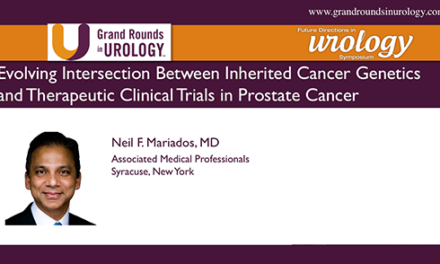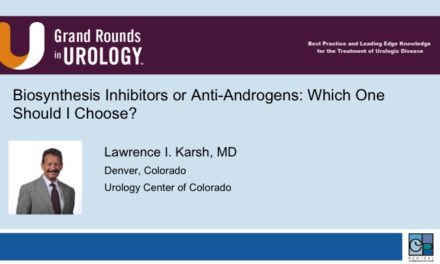Dr. Daniel P. Petrylak presented “Advanced Disease: A Real Need for Understanding and Shared Care” at the 27th annual International Prostate Cancer Update meeting on Friday, January 27, 2017.
Keywords: prostate cancer, sipuleucel-T, docetaxel, androgen, chemotherapy,enzalutamide, abiraterone
How to cite: Petrylak, Daniel P. “Advanced Disease: A Real Need for Understanding and Shared Care” January 27, 2017. Accessed Dec 2024. https://dev.grandroundsinurology.com/advanced-disease-real-need-understanding-shared-care
Transcipt
Advanced Disease: A Real Need for Understanding and Shared Care
The real issue about shared care, who should be treating these patients. So the treatment of advanced prostate cancer should be formed by the individuals that have the most experience in a given area, regardless of their subspecialty. So I think the best way you should think about this is would you want your prostate taken out by somebody who does one or two procedures per year. I certainly wouldn’t, I’d want the person with the most experience, the most ability to handle postoperative complications, because really it’s the situation where you get into trouble, the panic that ensues when there’s a toxicity or a bad result, that’s where the difference occurs in patient care.
So we want to maximize our clinical benefit for patients. And the multidisciplinary approach involves all treating clinicians, the urologist, medical oncologist, radiation oncologist, and now the primary care physician to manage some of the more complex internal medicine problems. Other key members I think that are important to the care team include a nutritionist. As we’ve seen from this meeting, diet is important, exercise is important, I think now a physical trainer also should be included. Pain management, we neglect pain in patients. In fact, now it’s a standard assessment in all of our patients at Yale that they have their pain measured, and that we include a palliative care physician. The hospice discussion I think occurs too late in the course of castration-resistant prostate cancer. You certainly don’t want a patient surprised that there are no further options. It’s a very, very fine line between destroying hope and being realistic about what the situation is. So we really want a person who is going to focus on each stage of prostate cancer management.
The benefits of the multidisciplinary approach have been documented by two different institutions, Lenny Gomella at Jefferson implemented a program and demonstrated that his survival rate was better when compared to the SEER data for the same area. So this suggested that the outcomes in many men with localized and high-risk prostate cancer were better, and certainly this would impart a better survival. And David at the University of Colorado has basically also shown the same thing, that this shows an elevated survival rate in the region. And these are again the histogram plots of the observed versus the anticipated survivals with this approach.
So this is not uncommon for other tumors, lung cancer, breast cancer, colorectal cancer. At Yale we have a multidisciplinary clinic for lung cancer. We have a de facto multidisciplinary GU clinic where we have tumor board once a week. And my office is actually in the urology department. So if there any questions that I have for the urologist, or vice versa, it’s very, very easy to have that approach where John Colberg is across the hall from me, or Brian Shuch is down the hall from me as well. And we can talk about cases, and we often do.
So, we want to improve the access to specialty therapies, we want to be more efficient with the patient’s schedules. It doesn’t have to be a physical multidisciplinary clinic, and we have to coordinate to avoid redundancies.
So I think that one of the things I’m going to outline in this talk, I’m going to go through each individual drug, is there’s a lack of clarity as to what the trigger points are with disease progression. And then who should be managing which of the individual side effects. This has been historically difficult. We’ve been very, very compartmentalized, but we really need to effect a change. And I think the EMR, one of the few positive things about the EMR is the fact that it’s easier to communicate within an institution. But as Dr. Cookson noted before, it’s difficult in practices. These EMRs don’t talk. In fact, one of the things that I had the good fortune of last year was going to the White House to talk about the Moon Shot, and talking with Senator Coburn and Vice President Biden, I found out that the EMR was offered to the Affordable Care Act (ACA) by both the Mayo Clinic as well as IBM. So we could have had a universal EMR that communicated. This would have facilitated data management, the multidisciplinary approach, and it didn’t happen. So I think that that’s to me the biggest disappointment of the Affordable Care Act.
So again, we also need to have feedback. When we discover that there’s a medical error, when we discover that there’s a difference of opinion, there needs to be an open and frank discussion as to what is going on. This only can improve patient care. And as we’ve seen from statistics recently, physicians are reluctant to admit errors. I think it’s because of the structure of our systems now, but they’re reluctant to do so. And I think we have to encourage that we disclose, and we then improve our care based upon this.
I think we’re moving away from the later referral of prostate cancer patients for therapeutic options, and I think that this has, again, been an advantage of the multidisciplinary approach. We have better quality treatments for this disease, and of course, there are differences of opinion as to how to administer these treatments.
It’s going to become more important, because the population is aging, we’re seeing more prostate cancer. But we’re also seeing fewer oncologist in the United States. There’s going to be a shortage, as well as fewer urologists, so we have to coordinate our efforts.
So, why is it becoming more important? It has to do with the sequence. This is 2010, two drugs, or actually basically three types of treatments; secondary hormonal manipulations where there was an unclear survival benefit. A three month difference with docetaxel, and then mitozantrone. Now this is actually 2017. Now we see that we can sequence agents differently. We have immunotherapy with sipuleucel-T, chemotherapy with docetaxel, and then as Cookson noted before, do we implement docetaxel as our first-line chemotherapy? We don’t have any data what the affect is of the adjuvant docetaxel on subsequent docetaxel administration. And I think that that’s something that we really do need to look at carefully, because we clearly don’t want to treat patients unnecessarily, and perhaps we should use other chemotherapeutic agents up front.
To note here, the only agent that is sequence specific that does not require prior, or actually does require prior treatment is cabazitaxel. Sipuleucel-T is actually approved for all stages of castration-resistant disease as long as they do not have visceral metastases. In fact, 15% of patients on the IMPACT trial did receive sipuleucel-T, did receive prior chemotherapy; excuse me. Zytiga, enzalutamide can be given pre and post chemotherapy, and of course, docetaxel is now being used earlier. So the only sequence-dependent drug here is cabazitaxel.
In shared care we like to think of this in terms of our classes of agents, and I think that this is important. Again, how do we select these immunotherapy with sipuleucel-T? Perhaps we’ll start seeing the checkpoint inhibitors approved over the next couple of years. Second generation hormonal treatments, such as abiraterone and enzalutamide. Cytotoxic treatments, which also fit into the hormonal category, as we mentioned before, docetaxel and cabazitaxel, and the DNA damaging agents with radium-223.
So what are the individual specific roles of each of these healthcare professionals in administering these treatments? Well, the urologist will diagnosis the disease. Sometimes the oncologist does if they get a primary referral for a metastatic lesion, but I think it’s extremely rare that I’ve seen this, at least as far as a primary care diagnosis is concerned. They administer local therapy with surgery, with cryosurgery, and they administer androgen blockade. The medical oncologist administers androgen blockade and chemotherapy, both of which can quarterback the administration of these other drugs. The primary care and the internist will help with managing side effects, including hypertension, diabetes, as well as pain. And the radiation oncologist will palliate symptoms, administer local therapy. And then there is, of course, the differences as to should be administering isotope therapy, should it be the nuclear med or the radiation oncologist. That’s institution dependent.
So, administering these agents, we like to break these up in terms of symptomatic versus asymptomatic. Rapidly progressive disease versus slowly progressive disease, visceral versus non-visceral. The pre and post docetaxel I think is becoming less and less clear at this particular point, and I think in the future we’ll be moving these biological markers. And again, who is going to manage this at the different stages of the disease? When should the genetics been sent off? My opinion is it should be as early as possible.
So, this is just simply the way in which castration-resistant prostate cancer develops. There are many, many roads to Rome, as we’ve often said. And this can occur from mutation of the androgen receptor. And Barret modification we saw yesterday with the heat shock proteins, alternative splicing, as well as intra – – synthesis of the androgen receptor. All of these lead to different pathways. And we have different drugs which can forth with this. We saw this yesterday, the IMPACT study, which led to the approval of sipuleucel-T for castration-resistant prostate cancer. Again, my opinion it should administered early. This can administered really by any healthcare professional, urologist, medical oncologist. The toxicities are fairly minor, but as we saw yesterday, this should be talked about early in the course of disease. It is clear that from the retrospective data that those patients who have the early administration of sipuleucel-T have the best benefit. It’s about a 13 month difference in the median survival, compared to a 2.8 month different if you wait later. So again, each of those professionals that we have seen before has to be educated to refer either through the urologist or the oncologist to administer this particular drug.
How do we manage side effects with sipuleucel-T? I think, again, this could be easily managed by any of the healthcare professionals I mentioned before. Chills, pyrexia, headaches, flu-like syndromes, myalgias, hypertension, hyperhidroses, as well as potentially groin pain in some patients. Very, very rarely do we see a serious adverse event. So again, I think that any healthcare professional, as long they know that they have to give something like Demerol for rigor when it occurs on a rare basis, can administer this particular drug.
We’ve talked a lot about the second generation hormone treatments over the last several days, particularly Zytiga and enzalutamide. As we know, these drugs will inhibit the synthesis of androgens. But there’s also a feedback mechanism that goes on with the increased secretion of ACTH and cortisol. And we know that these drugs improve survival in our patients, both in the chemo-naïve as well as the chemo refractory setting. And this is the chemo naïve data where we see a survival benefit. All of the different parameters with Zytiga are going in the right direction. Time to opiate use, time to chemotherapy initiation, these again, I think need to be discussed with the patient from a multidisciplinary standpoint. What are your goals of treatment? Are you trying to palliate symptoms, are you trying improve pain. All of our drugs that we have, really expect for sipuleucel-T, can have that potential. And these, again, have to be weighed by all healthcare professionals. And this the pre-chemotherapy COUGAR 302 data showing a survival benefit.
So again, we have to employ the use of all healthcare professionals in managing patients in this situation. There’s some, of course, that are more easily managed by the internist. In my opinion, cardiac disorders, fluid retention, this can managed by all three individuals, but I think the internist has the best experience in managing cardiac issues. I certainly can do that, as a medical oncologist I also have a background in internal medicine, but again, I feel more comfortable having a cardiologist or internal medicine physician manage this because they’re more up on the literature. We all can look at liver function abnormalities, and there was actually a warning about recently about this with sipuleucel-T. Hypertension, again, the internal medicine physician is best suited for this, because they’re up on the new drugs for hypertension. We were talking the other day about how do you monitor this. I recommend that our patients get home blood pressure monitoring, because often what I’ve found is the blood pressure that we see in the office is different than the blood pressure they have at home. The patients do develop white-coat syndrome. They feel nervous and anxious when they see the physician. They’re worried about their PSA going up or what’s the next treatment. So I think that this is really well managed by both the internist, as well as the other healthcare professionals. You have to watch out for hypokalemia. This can be issue, and patients need to have their blood monitored on a regular basis. Again, all three of these healthcare professionals can do so. Fatigue, anemia, back pain, these are routine types of questions, as well as laboratory results that you have to monitor them when you see your patient.
Enzalutamide is an androgen receptor antagonist. As we know, it has a basically three-pronged effect on the androgen receptor. It prevents binding of the androgens to the receptor. It inhibits translocation, and it also inhibits binding to DNA. And we know that, again, as we see with abiraterone, that we have survival benefits both in pre-chemotherapy and in the post-chemotherapy situation. PREVAIL was the pre-chemotherapy trial that again showed a survival benefit, a 30% reduction in the risk of death, and a proven progression-free survival. This is the overall survival for the PREVAIL.
So again, how does the internal medicine urologist and the medical oncologist help to manage these particular issues? I think again, the important issues here are seizures and fatigue. We have to really counsel our patients to make sure that they report to us when they’re feeling tired, when they’re having issues with drug management. I think that there’s really a great area where we can improve supportive care for this particular drug. Nobody has really defined the role of things like stimulants, like Ritalin or other agents which may help to overcome the fatigue. As we saw the other day, this is particularly related to GABA. Cardiac disorders can occurs with enzalutamide; although, they’re I think a little bit rarer than they are with abiraterone. And you can see seizures, which is the other big issue here. I don’t think you really need a neurologist to come on board, but again, these are things that you need to communicate to the internist, as well as to the oncologist. All three of the subspecialties need to be involved in that decision.
So in conclusion, the optimal sequence of agents is yet to be determined. This I think again needs to be discussed amongst all healthcare professionals. Certainly you’re going to use different agents for different comorbidities. As we saw the other day, docetaxel chemotherapy should be offered to these patients in the early setting, but it depends upon what their other general medical issues are. And I think the other important issue is immunotherapy should be given earlier. But all these treatments need to be administered by a coordinated effort, because the important issue is not who takes care of the patient, but what the outcome of the patient is.
ABOUT THE AUTHOR
Daniel P. Petrylak, MD, is currently Director of Genitourinary Oncology, Professor of Medicine and Urology, Co-Leader of Cancer Signaling Networks, and Co-Director of the Signal Transduction Program at Yale University Cancer Center in New Haven, Connecticut. He is a recognized international leader in the urology field. He earned his MD at Case Western Reserve University School of Medicine in Cleveland Ohio. He then went on to complete his Internal Medicine Residency at Albert Einstein College of Medicine/Jacobi Medical Center in the Bronx, and his fellowship at Memorial Sloan Kettering Cancer Center in New York.
Dr. Petrylak has served as principal investigator (PI) or co-PI on several SWOG clinical trials for genitourinary cancers. Most notably, he served as the PI for a randomized trial that led to the FDA approval of docetaxel in hormone refractory prostate cancer. He also helped to design and served as PI for the SPARC trial, an international registration trial evaluating satraplatin as a second-line therapy for hormone refractory prostate cancer.
Dr. Petrylak served on the program committees for the annual meetings of the American Urological Association from 2003-2011, and for the American Society of Clinical Oncology from 1995-1997 and 2001-2003. He also has served as a committee member for the Devices and Immunologicals section of the FDA. He has published extensively in the New England Journal of Medicine, Journal of Clinical Oncology, Journal of the National Cancer Institute, Cancer Research, and Clinical Cancer Research.





